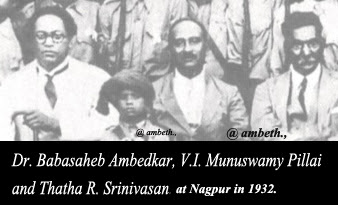 |
| Jai Bheem / Jai bhim ( English Weekly ) and Thanthai N. Sivaraj |
Facts About 'Jai Bheem' ( English Weekly ):
* In the Mid-1940s, Thanthai N. Sivaraj edited and published an English journal named 'Jai Bheem' at Madras.
* Its initial publications were issued weekly on Tuesday (1946). Later issued on Wednesday.
* It spread the issues of the marginalized sections, AISCF meetings, notes and comments on political topics, Speeches of Dr. Babasaheb Ambedkar, Thanthai N. Sivaraj and other leaders etc.,
 |
Pallikonda Krishnaswamy, Yashwant Ambedkar,
Annai Meenambal and Thanthai Sivaraj.
|
Here I have given some important words of Dr. Babasaheb Ambedkar where published in 'Jai Bheem' [1946-1947]:
1. "The Scheduled Castes were not asking for a territorial division. All that they wanted was a fair deal. All that they wanted was equal political rights and no patronage."
[March 5th, 1946]
[March 5th, 1946]
2. "We like this country to progress much as anybody else does. We do not want to stand in the way of that. All we want is that our position is safeguard in the future of India. To this end we will take part in every kind of struggle against the British proposals."
[August 13, 1946]
[August 13, 1946]
3. "Refering to the movement started by the AISCF Dr. Ambedkar said that their fight for the achievement of their legitimate rights would continue. 'We may be conquered, but we shall not capitulate."
[September 16, 1946]
[September 16, 1946]
4. "It is because the Scheduled Castes have come to realize that the assimilation or absorption of the Scheduled Castes into the the Hindu community is vain hope; and is only a dream, that they have decided to ask for separate electorates."
[September 25, 1946]
[September 25, 1946]
5. "A separate electorate would alone guarantee to the Scheduled Castes the possibility of electing to the legislatures members of their own who could be trusted to fight in the legislatures and the executive whenever they did anything which had the effect of nullifying the rights of the Untouchables. It will be noticed that the Congress has been able to elect on its ticket representatives of the Scheduled Castes all throughout India in the different provincial legislatures. And yet, not one of them has even asked a question, moved a resolution or tabled a cut motion in order to ventilate the grievances of the Scheduled Castes. It would be much better not to have representation at all than to have such sham representation in the legislature."
[December 25, 1946]
[December 25, 1946]
6. "Hinduism and social union are incompatible. By its very genius Hinduism believes in social separation which is another name for social disunity and even creates social separation. If Hindus wish to be one they will have to discard Hinduism. They cannot be one without violating Hinduism. Hinduism is the greatest obstacle to Hindu Unity. Hinduism cannot create that longing to belong which is the basis of all social unity. On the contrary Hinduism creates an eagerness to separate."
[February 16, 1947]
[February 16, 1947]
7. "Greatness can be achieved only by struggle and sacrifice. No man can achieve greatness, unless he is prepared for struggle and sacrifice. He must be ready to sacrifice the comforts, and even the necessities of the present, for building up his future. My message is struggle and more struggle, sacrifice and more sacrifice. It is struggle and struggle alone. Nothing else will."
[April 13, 1947]
[April 13, 1947]
8. "Noble is your aim and sublime and glorious is your mission. Blessed are those who are awakened to their duty to those among whom they are born. Glory to those who devote their time, talents and their all to the amelioration of slavery. Glory to those who would reap their struggle for the liberation of the enslaved in spite of heavy odds, carping humiliation, storms and dangers till the downtrodden secure their Human Rights."
[April 13, 1947]
[April 13, 1947]
9. "Celebrations of birthdays from one point of view are not very happy. As you know, man is mortal and he must pass away someday. Birthdays are remainders that there have been several deductions from one's life. Of course, these deductions are not to regretted by anybody, because it is natural that man should spend his life. However, in a case where the life of a man is devoted to some public cause, it does become a matter of some consideration...... I have loyalty to our people inhabiting this country. I have also loyalty to this country. I have no doubt that you have the same. All of us want this country to be free. So far as I am concerned my conduct has been guided by the consideration that we shall place no great difficulties in the way of this country achieving its freedom."
[May 25, 1947]
[May 25, 1947]
Compiled:
Ambeth,
Ambeth,
Dharmapuri,
Tamil Nadu.
Reference:
* Dr. Babasaheb Ambedkar Writings and Speeches, English Volume 17, Part-III or Tamil Volume 37. [ Special Thanks to Videesha Yashwant Umare for this Book ]
Jai bheem...!!!
Read More:
* Thanthai N. Sivaraj -- National Level Leader Who Worked for the Scheduled Classes of India.
 |
| Jai bheem, Ambedkar, N. Sivaraj |
Read More:
* Thanthai N. Sivaraj -- National Level Leader Who Worked for the Scheduled Classes of India.






